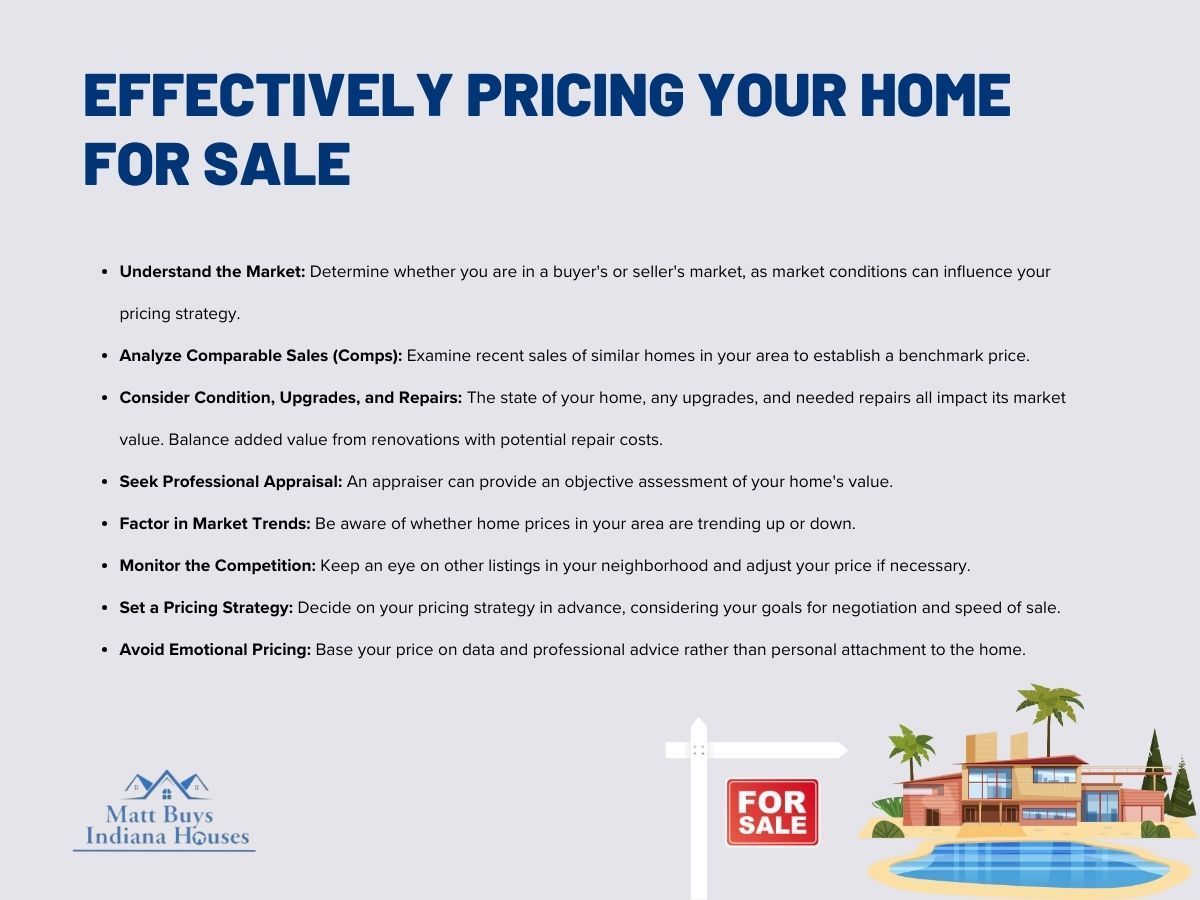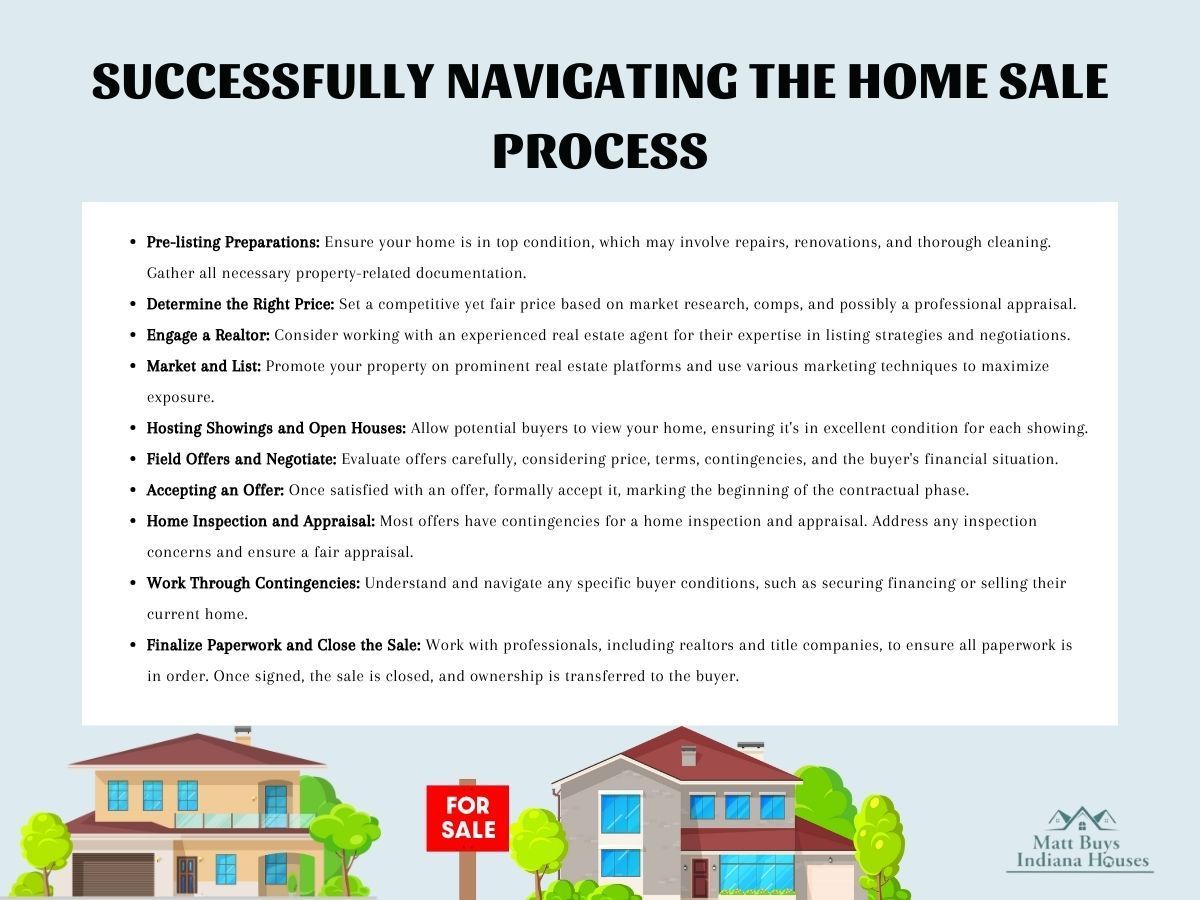How to Sell a House in Mishawaka, Indiana
November 11, 2023
Nestled in the heart of Indiana, Mishawaka boasts a real estate landscape as unique and vibrant as its history. While the principles of selling a house may seem universal, every locale offers its distinct challenges and opportunities.
In Mishawaka, sellers are presented with a blend of traditional charm, local amenities, and
shifting market dynamics.
This guide aims to illuminate the path for homeowners navigating the nuances of the Mishawaka real estate market, ensuring a sale that aligns with their expectations and the city's distinctive character.
Whether you're a first-time seller or a seasoned real estate enthusiast, understanding the Mishawaka-specific context is your first step to a successful home sale journey.
Understanding the Mishawaka Real Estate Market
Mishawaka, part of the South Bend-Mishawaka metropolitan area in Indiana, has a diverse real estate landscape influenced by its industrial past. The market comprises single-family homes, condos, townhouses, and multi-family units.
Demand and supply trends, often affected by employment opportunities, educational institutions, and local amenities, significantly determine property values.
Seasonal changes, with increased activity in warmer months, can affect buying and selling patterns.
Additionally, upcoming infrastructural projects, local policies, and taxes can potentially impact the market. Overall, insights into these dynamics and current market data are essential for successful real estate transactions in Mishawaka.
Before listing your home, research the local real estate market:
- Local Property Prices: Check out current listings in Mishawaka to gauge the competition and understand the price range for homes similar to yours.
- Trends: Is the market favoring buyers or sellers? This will impact how you price and market your home.
- Local Amenities: Proximity to good schools, parks, shopping centers, and other amenities can increase the value of your home.
Preparing Your Home for Sale
Preparing your home for sale can significantly influence its appeal to potential buyers and, ultimately the price it can fetch on the market. A well-prepared home not only attracts more prospective buyers but also helps in expediting the sale process.
Here are steps and tips to ensure your home is sale-ready:
- Declutter & Depersonalize: Remove excess items and personal mementos to make spaces appear larger and neutral for potential buyers.
- Clean: Clean your home thoroughly, considering professional services for deep cleaning tasks.
- Minor Repairs: Address any small issues like leaky faucets or broken tiles.
- Home Inspection: A pre-sale inspection can identify and rectify potential deterrents for buyers.
- Staging: Arrange furniture to maximize space and consider neutral decor and paint.
- Curb Appeal: Enhance the home's exterior with tidy landscaping and ensure the entrance is welcoming.
- Lighting: Ensure rooms are well-lit and update any outdated fixtures.
- Manage Pets: Clean pet areas and consider relocating pets during showings.
- Documentation: Have on hand any renovation records and available warranties.
Pricing Your Home
Setting the right price for your home is a critical step in the selling process. An appropriately priced home can attract potential buyers quickly and facilitate a faster sale, while an overpriced home might linger on the market.
Here's a guide to help you price your home effectively:

1. Understand the Market:
As aforementioned, knowing whether you're in a buyer's or seller's market is essential. A seller's market, characterized by high demand, might allow for higher pricing. Conversely, in a buyer's market, homes may need to be priced more competitively to stand out.
2. Analyze Comparable Sales (Comps):
Examine recent sales of homes similar to yours in terms of location, size, age, and condition. These should be in the same neighborhood or a close vicinity and have sold within the last 3-6 months. Comps provide a tangible benchmark for setting your price.
3. Condition, Upgrades, and Repairs:
The condition of your home plays a significant role in its valuation. Homes with recent upgrades or renovations, such as modern kitchens or updated bathrooms, can command higher prices. Conversely, if there are pending repairs or outdated features, these can decrease your home's market value.
It's essential to strike a balance: consider the added value from any renovations and subtract potential costs that new owners might face for necessary repairs.
4. Seek Professional Appraisal:
An appraiser offers an objective viewpoint on your home's value, providing a reliable benchmark for setting your price.
5. Factor in Market Trends:
Is the general trend in your area showing rising or falling home prices? Keeping an eye on these trends can help you adjust your pricing strategy accordingly.
6. Be Aware of the Competition:
Stay updated on other listings in your vicinity. A price adjustment might be necessary if several similar homes are priced lower than yours.
7. Flexibility and Strategy:
Decide on your pricing strategy ahead of time. Some sellers price a bit higher to leave negotiation room, while others aim for a quick sale with competitive pricing. Regardless of your initial strategy, stay open to feedback and be ready to adjust if the market demands.
8. Avoid Emotional Pricing:
While your home may hold immense sentimental value for you, potential buyers see it from a purely objective standpoint. Rely on hard data and professional advice to set your price, rather than personal attachment.
Pricing is a delicate balance of research, objective evaluation, and strategic decision-making.
Partnering with an experienced realtor can provide invaluable insights and guidance in this pivotal selling process step.
Marketing and Listing
In today's competitive real estate landscape, merely putting up a "For Sale" sign in the yard isn't enough. A comprehensive marketing and listing strategy can amplify your home's visibility, attract potential buyers, and help secure a top-dollar sale.
Here's how to make your property stand out:
- Professional Imagery: Use high-quality photos, including drone shots for larger properties, and offer video walkthroughs or 3D virtual tours.
- Engaging Descriptions: Write captivating descriptions detailing your home's features and the benefits of its location.
- Online and Traditional Outreach: List on major real estate platforms and use social media for wider reach. Don't overlook traditional methods like open houses and print brochures.
- Networking and Staging: Utilize personal connections to spread the word and ensure your home is well-presented, considering professional staging.
- Pricing and Adaptability: Price your home competitively based on market research but be open to adjustments based on feedback.
Effective marketing and listing of your home are pivotal in attracting the right buyers and securing the best offers.
Leveraging digital and traditional marketing avenues and a keen understanding of what buyers are looking for can set your property apart in a bustling real estate market.
Navigating the Sale Process
Selling a home is more than just finding a buyer; it involves a series of steps that, when executed correctly, ensure a smooth transaction and favorable outcome for all parties involved. Here's a guide to help you navigate the intricate sale process:

1. Pre-listing Preparations:
Before even listing your home, ensure it’s in the best condition possible. This might involve repairs, renovations, or simply deep cleaning. You should also gather all necessary documentation related to the property, such as renovation receipts or warranty papers.
2. Determine the Right Price:
Based on market research, comps (comparable sales), and possibly a professional appraisal, set a competitive yet fair price for your property.
3. Engage a Realtor:
While you can sell your home on your own, a knowledgeable real estate agent can provide invaluable expertise, from listing strategies to negotiations.
4. Market and List:
Ensure your property is listed on prominent real estate platforms, complemented by both digital and traditional marketing techniques, to maximize exposure.
5. Hosting Showings and Open Houses:
Allow potential buyers to view the property. Ensure flexibility in scheduling and that your home is in pristine condition for each viewing.
6. Field Offers and Negotiate:
Once offers come in, evaluate them with care. Consider not just the price but also the terms, contingencies, and the potential buyer's financial health.
7. Accepting an Offer:
Once you're satisfied with an offer, accept it formally, marking the beginning of the contractual phase.
8. Home Inspection and Appraisal:
Most offers are contingent upon a successful home inspection and appraisal. Address any concerns raised during the inspection, and ensure your home is appraised fairly.
9. Work Through Contingencies:
Some buyers might have specific conditions to meet before the sale can progress, such as securing financing or selling their current home. It's essential to understand and work through these as needed.
10. Finalize Paperwork and Close the Sale:
With all contingencies met, work with your realtor, the buyer's agent, and potentially a title company to ensure all paperwork is in order. Once everything is signed, the sale is officially closed, and ownership is transferred to the buyer.
Navigating the home sale process can be intricate, but with careful planning, a solid understanding of each step, and the guidance of a
real estate professional, you can achieve a smooth and successful sale.
Considerations for Mishawaka Homeowners
Like many unique localities, Mishawaka, Indiana has its own set of considerations for homeowners looking to sell. It’s essential to understand the local market, its nuances, and the factors that can influence a successful sale.
Here are some tailored considerations for Mishawaka homeowners:

- Property Taxes: St. Joseph County has its own set of property tax rates and potential exemptions. Ensure clarity about any balances or tax benefits related to your property to address potential buyer queries.
- Proximity to Amenities: Mishawaka has several local attractions like Battell Park and University Park Mall. Emphasizing the convenience and accessibility of these amenities from your property can boost its appeal.
- Educational Institutions: For families, proximity to reputable schools is crucial. Highlighting your property's closeness to institutions within the School City of Mishawaka district can be a selling point.
- Historical Significance: Mishawaka has a rich heritage. If your property has historical value or is near cultural landmarks, spotlighting this can attract buyers interested in a home with character and history.
- Seasonal Selling Points: Indiana's diverse seasons mean your property will look different throughout the year. Consider the ideal time to showcase your home — a snow-covered winter charm or a sunny summer appeal.
- Local Economic Developments: Keep abreast of new businesses, infrastructure projects, or other significant economic developments in Mishawaka that might boost property values or demand.
- Neighborhood Dynamics: Every neighborhood has its unique appeal and challenges. Understand your neighborhood's specific dynamics, upcoming developments, community events, or other changes.
- Awareness of Flood Zones: Properties near the St. Joseph River may have flood risks. Familiarize yourself with flood zone designations, their implications for insurance, and how they might influence buyer perceptions.
- Leveraging Local Expertise: Engaging a realtor with in-depth knowledge of Mishawaka can be invaluable. Their insights, network, and familiarity with local trends can streamline the selling process and potentially fetch a better price.
Conclusion
Navigating the real estate market in Mishawaka, Indiana, is a journey that requires a unique blend of broad industry knowledge and a deep understanding of local nuances.
From being attuned to market shifts to leveraging the city's rich history and amenities, each step in the selling process holds its significance. By embracing both the distinct characteristics of Mishawaka and the overarching principles of real estate, homeowners can position their properties for a successful and rewarding sale.
Whether it's your first time selling or you're a seasoned homeowner, the key lies in research, preparation, and choosing the right local partners to guide you through the process.











